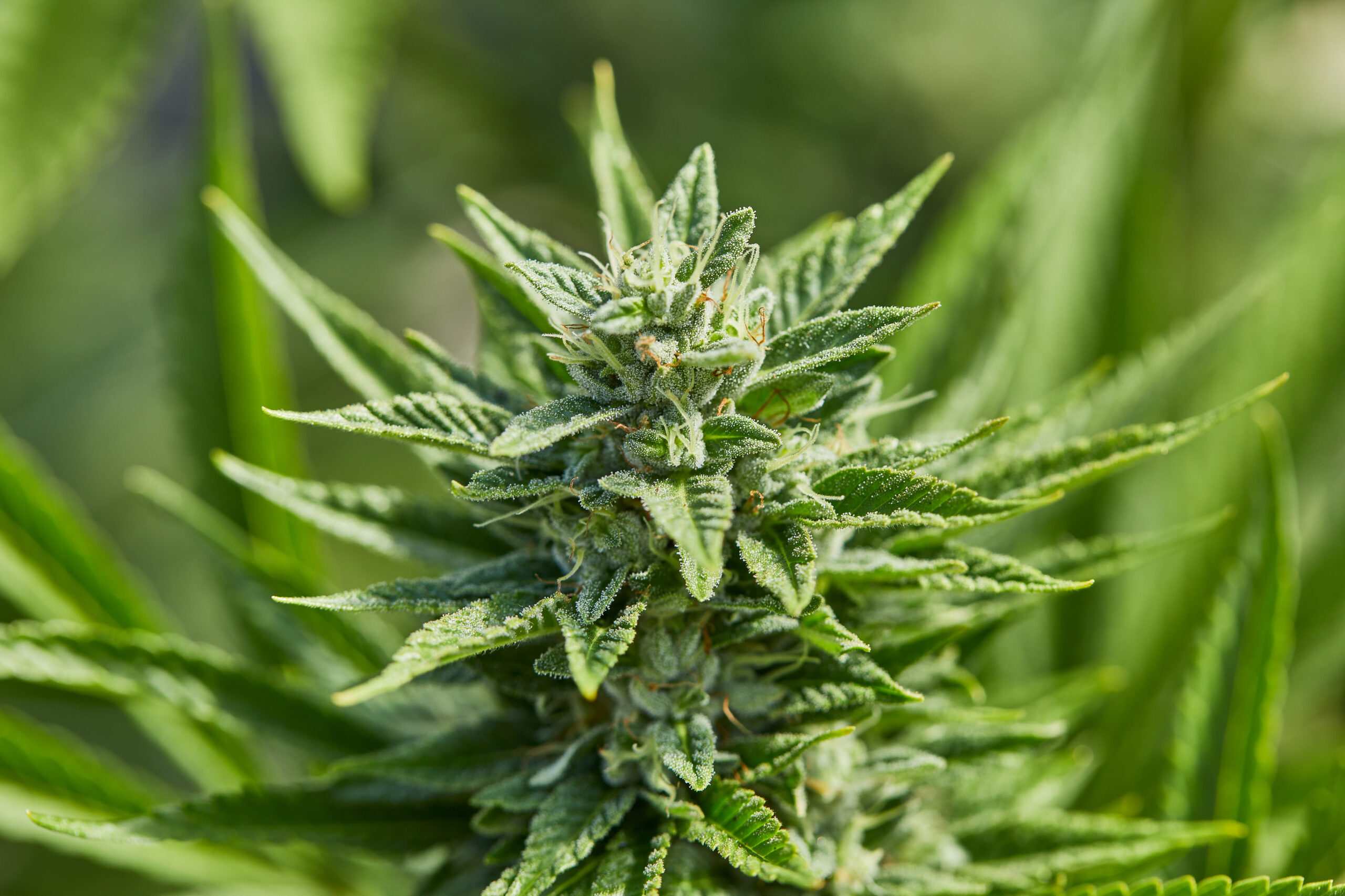In the US, nearly 2 million people are diagnosed with some form of cancer each year. Cancer is the umbrella term for over 100 different diseases characterized by the uncontrolled growth and spread of abnormal cells. Medical cannabis has emerged as an alternative treatment option for many ailments, including Parkinson's disease, epilepsy, and others, but can it help treat cancer?
Learn about the current research on cannabis for cancer, hear patient stories, and see what the experts have to say.
An overview of the research
Cannabinoids and other compounds found in cannabis have documented anticancer effects found in both in vitro (petri dish) and in vivo (animal) studies. These compounds, found in whole-plant cannabis extract and hemp, have been shown to reduce tumor growth, cause cancer cell death, block the spread of cancer cells, and inhibit cancer's ability to grow its own blood vessels.
 Photo by: Gina Coleman/Weedmaps
Photo by: Gina Coleman/WeedmapsImage lightbox

A comprehensive review of the anticancer properties of cannabinoids and other cannabis compounds was published in the journal Cancers in 2020, stating that THC and CBD, as well as the lesser-known CBG and CBN, in addition to potent flavonoids and terpenes, had anticancer potential. The researchers concluded that, while cannabis might not succeed as a stand-alone therapy, “...many of the compounds present in cannabis could be part of a therapeutic solution for patients living with and beyond cancer.”
Here are some highlights from this review:
- THC had anticancer activity in preclinical studies against many different cancers, including breast cancer and pancreatic cancer, gliomas, leukemia, and melanoma, along with liver, prostate, colon, oral, endometrial, and cervical cancers.
- CBD had anticancer activity in preclinical studies against breast cancer, lung cancer, glioma, neuroblastoma, myeloma, colon cancer, prostate cancer, and melanoma.
- Linalool, a common terpene in cannabis, was found to reduce the viability of oral cancer cells.
- Limonene, another common terpene found in cannabis, exhibited anti-cancer effects by reducing tumor enlargement and suppressing the growth of bladder and colon cancer cells.
Additionally, research has found that cannabinoids may synergize with certain chemotherapy treatments and with radiation to enhance cancer-killing effects.
With growing interest in minor cannabinoids such as CBG (cannabigerol), CBDV (cannabidivarin), and CBN (cannabinol), researchers are now exploring their potential anticancer effects. Recent laboratory studies have shown that these compounds may reduce the viability of breast cancer, colorectal cancer, and prostate cancer cells, suggesting they could play a role in future treatment. While these findings are promising, they remain limited to preclinical models, and more clinical research is needed to understand their real-world impact.
The only study using cannabinoids to treat cancer in humans found impressive results. Patients with recurrent glioblastoma, an aggressive brain cancer with a very poor prognosis, received either temozolomide (standard chemotherapy for this type of tumor) alone or temozolomide plus a 1:1 THC:CBD tincture. The investigators reported that patients treated with the chemo plus cannabis had an 83% one-year survival compared with 53% one-year survival with the chemo alone.
Cannabis to alleviate side effects of cancer and cancer treatment
There is a large body of research that supports the use of cannabis to help alleviate the side effects of cancer and cancer treatment.
 Photo by: Gina Coleman/Weedmaps
Photo by: Gina Coleman/WeedmapsImage lightbox

A 2019 review of the scientific literature stated, “There is a reasonable amount of evidence to consider cannabis for nausea and vomiting, loss of appetite, and pain as a supplement to first-line treatments.” There is also evidence that CBD may help decrease chemotherapy-induced neuropathy, a painful condition that can result from damage to the nerves in fingers, hands, toes, and feet.
Medical cannabis patients share their stories
Four medical cannabis patients shared their experiences with Weedmaps and explained how cannabis plays a role in their cancer care and treatment. Responses were lightly edited for clarity — full names were omitted for privacy.
Patient one: DM
"Receiving a cancer diagnosis was surely life-shattering for me,” said DM. At the time, she was a “health-conscious personal trainer,” sharing that she “[created] healthful plant-based meals for my clients. It just didn't seem right that it was me who needed the help and guidance now for the fight of my life.” DM chose to heal her body with natural methods and decided against chemotherapy as a form of treatment. “I was very fortunate to have found great practitioners and doctors to help me on this journey of natural healing. Of course, I was criticized and told I was going to die due to this choice I made. I knew cannabis would be a big part of my healing.”
DM had used cannabis as medicine for years, “When one of my doctors told me I needed to have no stress in my life, that surely made me laugh. How do you not stress when you have this disease? Cannabis was like a blanket that helped me sleep when my head was spinning, and I couldn't turn off the incessant thoughts about this disease. How can you think of anything else while you have cancer active in your body?” DM felt that cannabis had helped her make sense of what she was going through.
“People had told me about 'cancer brain,' and I understood it once I was sitting amongst it. The plant itself is not only supportive and loving, but once I came out of the initial fog of RSO, I started to go to cannabis meetings and events to meet some of the most amazing people I have encountered throughout my life. Cannabis brings healers together, and I was very fortunate to have these people holding me up through my fight. I am grateful to say I am still cancer-free today, almost six years later! I have since received a certificate from Oaksterdam University and worked with several cannabis companies and patients, helping educate and support others about this plant that I love and am deeply grateful for."
Patient two: RY
“Cannabis has changed our 5-year-old and his struggles with his brain cancer diagnosis,” shared RY's mother. “Prior to adding cannabis to his treatment, he was low energy, underweight, and uninterested in daily activities. After 15 months of cannabis treatment in conjunction with his chemo regimen, he is a new child. Almost instantly, we saw a change.”
“He quickly became more excited for each day, being the first in our family to ask to go outside and explore; within the first six months of adding cannabis, his weight evened out, and we started to see the excitement in his eyes again. We've even seen a change in his focal seizures, giving us more relief time in between his 'monthly clusters' as well as reducing the length of his seizures. We couldn't be more grateful for our guidance to add cannabis to his treatment. Quality of life is so important to us, and we know this adds so much quality to his.”
Patient three: VL
“When our baby was going through treatment for leukemia, the chemo meds almost killed him,” said VL's mother. “We turned to cannabis as a way to help our son start eating again. Little did we know at the time that cannabis would save his life. It increased his appetite, drastically reduced the chemo side effects, protected him from nerve damage, and has helped keep him cancer-free to this day. We doubt he would have survived if we didn't have the cannabis to help his little body stay strong. He is a warrior, and thanks to the help of cannabis, we are still able to give him hugs today and watch him grow and thrive.”
Patient four: AD
“Cannabis has helped our son thrive through brain cancer the last six years,” shared AD's mom. “And it has helped him endure all of the secondary conditions he has had to battle as a result of the toxic treatments, including being on dialysis.” After receiving the blessing from the oncologist to be under the guidance of Dr. Bonni Goldstein and introducing cannabis to her son, AD's mom explained, “Not only did his kidney function start to improve, but even after being told he would likely never be able to come off of dialysis, he did. After two years of being dependent on it, he was able to come off of it, and his kidney function has continued to improve. Most importantly, it has also helped our son's brain cancer remain stable.”
What the experts say about cannabis and cancer
Bonni Goldstein, MD, medical director of Canna-Centers and medical advisor to Weedmaps, reiterated the importance of cancer patients consulting with a cannabis-knowledgeable clinician before starting cannabis. “Over the last 15 years, I have treated a few thousand cancer patients, including children, receiving conventional chemotherapy and/or radiation. Cannabis used for symptom control can be key to maintaining a good quality of life, as it can help with nausea, vomiting, appetite, pain, sleep, and anxiety. Some patients who have come to my office with advanced cancers and limited options added a supervised high-dose cannabis protocol to their traditional cancer treatment and found an extension of life, with some achieving remission.”
Cannabis and immunotherapy
Immunotherapy is a specific type of cancer treatment that harnesses a person's own immune system to fight cancer. Several research studies from Israel found that some patients using cannabis while on certain immunotherapy agents had lower response rates, increased time to tumor progression, and decreased overall survival, likely from cannabinoids interfering with the action of the immunotherapy drug.
A more recent study on a particular type of immunotherapy for one type of cancer did not find these same results, indicating this is still an unsettled question. Dr. Goldstein cautions that cancer patients on immunotherapy should always check with a clinician who is aware of these potential issues before using cannabis, stating, “If immunotherapy may save your life, it doesn't make sense to decrease its efficacy with cannabis.”
Does smoking weed cause cancer?
One question that may concern cancer patients is whether smoking cannabis can cause lung cancer. Although cannabis smoke contains carcinogenic compounds, a large study from researchers at UCLA found no significant association between cannabis smoking and respiratory tract cancers. Additional research reported similar findings of no increased risk of lung cancer in cannabis smokers.
 Photo by: Gina Coleman/Weedmaps
Photo by: Gina Coleman/WeedmapsImage lightbox

Three studies have reported an increased risk of testicular cancer in cannabis users, with one study reporting that those using cannabis on a weekly basis had a 2.5 times greater risk compared to men who never used cannabis.
Bottom line
Medical cannabis has been shown to be a helpful adjunctive treatment when it comes to managing symptoms from cancer and cancer treatment, including pain, chemotherapy-induced nausea and vomiting, and loss of appetite. Reports from cancer patients show that overall quality of life can be significantly improved with cannabis use.
Additionally, there is a large amount of research documenting the anticancer effects of cannabinoids and other cannabis compounds in test-tube and animal studies, but unfortunately, human clinical trials are scarce. Speaking with a clinician who is knowledgeable about cannabis can help cancer patients understand how they may incorporate a cannabis regimen that will lead to the best outcome for their unique situation. With more human trials underway, the next decade may provide clarity and direction about the use of cannabinoids and potentially prevent cancer. Add this




